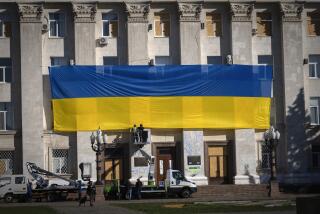Systematic Plundering of Chechnya Reported
- Share via
GROZNY, Russia — Federal forces in the separatist republic of Chechnya have engaged in widespread, systematic looting of occupied territory, hauling household goods by the truckload to other parts of Russia, sometimes even killing witnesses to their crimes, Chechen civilians and human rights activists say.
As Russian troops have moved into captured cities and towns, convoys of military trucks stuffed with appliances, rugs and kitchenware that once furnished Chechen homes have become a familiar sight on the roads leading out of the devastated province, witnesses say.
At a military airport near Grozny, the ruined Chechen capital, helicopters and trucks deliver stolen household goods that are then transferred to military transport planes, said Satsita Timrayeva, 31, a worker at the airfield.
“I have witnessed many times how soldiers brought truckloads of looted things to the airport to be further shipped to Mozdok, Khasavyurt or other destinations in Russia,” she said. “I am sure this is all looted. Has anyone ever seen a commando company, for instance, traveling with bathroom mirrors, freezers or carpets? They take everything they can carry.”
Based on the accounts of Chechen refugees who have fled to the neighboring republic of Ingushetia, human rights activists charge that Russian soldiers engaged in looting have killed dozens of civilians who sought to stop the soldiers or happened to witness their crimes.
New York-based Human Rights Watch has documented 123 cases in which soldiers allegedly killed civilians, and nearly all of them occurred while the killers were looting Chechen homes, the group says.
“Looting is the most systematic abuse occurring in Chechnya,” said Malcolm Hawkes, a Human Rights Watch researcher reached in Ingushetia. “It’s highly organized; it’s highly efficient. It is occurring with the full knowledge of the military authorities. Military vehicles are used to carry off the goods.”
Russian officials repeatedly have dismissed most charges of atrocities in Chechnya as rebel propaganda. In Moscow, the chief military prosecutor, Yuri G. Dyomin, said Friday that it would be “impossible” for looting to take place on such a mass scale because it would require the connivance of entire military units, their officers and guards at the numerous checkpoints in the occupied territory.
“In a war zone, it’s completely unthinkable,” the military prosecutor said. “And to start with, who needs all that junk?”
Acting President Vladimir V. Putin, whose popularity has soared because of the war, has refused to allow any independent international investigation of charges of looting, executions, rape and other brutality in Chechnya. Nor has Putin, who is widely expected to win election Sunday, risked offending the military by speaking out against atrocities or urging his troops to respect the rights of civilians.
This week, Dyomin announced that Russian soldiers were not involved in the slaughter of 62 civilians in the village of Aldy last month. He left open the possibility, however, that elite Interior Ministry police troops known as the OMON--who do not come under his jurisdiction--took part in the alleged killings. The case is still being investigated, he said.
Despite Russia’s official denials of looting, Chechen civilians provide vivid accounts of how soldiers and police troops have stripped homes bare, carted away the goods in military vehicles and--out of spite or to destroy evidence--set houses on fire.
In Aldy, Kometa Imayeva described how she watched in February as soldiers looted the house of her neighbors, the Rakhmayevs. Another neighbor, 80-year-old Akhmed Atbiyev, approached the soldiers and asked them to take only what they needed in their daily lives.
Without saying a word, one of the soldiers turned and shot the old man, she recounted. When his 76-year-old sister, Sabila, ran up to the body and began wailing, the same soldier shot her too, Imayeva said.
“After this, the group continued loading the booty onto the truck,” she said. “The fact that they had just killed two peaceful elderly people did not stop the marauders.”
On highways, the military often makes no effort to hide its activities. One convoy of five large trucks stuffed with household goods was headed toward the border with Ingushetia in late February. It was escorted by Interior Ministry troops apparently leaving Chechnya after their tour of duty in the war zone. In the last truck, men in uniform could be seen taking women’s and children’s clothes out of large canvas bags and holding them up, apparently selecting the items they wanted.
Zara Khamidova, a refugee who returned to Grozny in mid-March, described systematic looting and destruction of the city by Russian forces.
“The pattern is always the same: First they send out a reconnaissance detail to see what is left in the houses and where a truck needs to be sent to, to collect the property,” she said. “Then soldiers arrive on trucks in the afternoon, escorted by one or two armored personnel carriers for protection. They take the things out, load them on the trucks, set the houses on fire and leave. They always work very promptly, like professionals.”
Another Grozny resident, Satsita Akhtayeva, 38, said she watched last month as soldiers drove up to a nine-story apartment building in a huge truck and loaded up stereo equipment, kitchenware, crystal, rugs, strollers and other items.
“The soldiers were working hard while their commander was giving them orders on what to take and how to load it on the truck,” she said.
Next door, another group of soldiers was loading a second truck while an armored personnel carrier stood guard, she said. “I knew the soldiers were stealing from civilian apartments, but I did not have the courage to tell them to stop,” she said. “I was alone, and they would have killed me as an accidental witness to their crime.”
Human Rights Watch researcher Peter Bouckaert said inaction by military officials has given soldiers the sense that looting homes and abusing the local population are acceptable conduct.
“The military command has done little to stop looting or to punish soldiers who are caught looting,” he said. “Therefore, a climate of impunity has rapidly developed. The looting in Chechnya is so widespread that it is simply impossible for the military command to be unaware of the problem.”
While Russia has said it is trying to eradicate bandits, restore normal life in Chechnya and win the trust of the civilian population, the alleged conduct of its soldiers has undercut the government’s public relations efforts. Some Chechens say the rebels’ ranks have been bolstered by men who had no interest in fighting until they lost their relatives or their homes to pillaging Russian soldiers.
In the town of Alkhan-Kala, Movlad Khazayev recounted how four Russian soldiers entered his house and announced that they were staying overnight. Khazayev said he tried to be hospitable--he fed them the last of his food and let them sleep in the family’s beds.
In the morning, the soldiers showed their gratitude: The lieutenant in charge ordered Khazayev, 62, and his family into the cellar and threatened to kill them if they came out while the soldiers were still there, he said. The family members huddled in the dark for hours before they dared to go upstairs.
“What a sight we saw when we emerged from the basement,” Khazayev said. “Everything was taken out of our house. A TV set, a refrigerator, a stereo, a vacuum cleaner, several rugs, kitchenware, a washing machine--everything was gone.”
Human rights researcher Hawkes said Russian soldiers typically keep the looted items they want but sell most of it at secondhand markets that flourish throughout Russia. Authorities make no effort to seize the stolen goods at the markets and to try to return them to their owners, he said.
“Given the brazen and open manner in which Chechen homes are being stripped bare, the widespread reporting of the phenomenon and the massive eyewitness testimony to the looting,” he said, “one must assume this is de facto military policy in the region.”
*
Special correspondent Nunayev reported from Grozny, Aldy and Alkhan-Kala. Times staff writer Paddock reported from Moscow.
More to Read
Sign up for Essential California
The most important California stories and recommendations in your inbox every morning.
You may occasionally receive promotional content from the Los Angeles Times.










